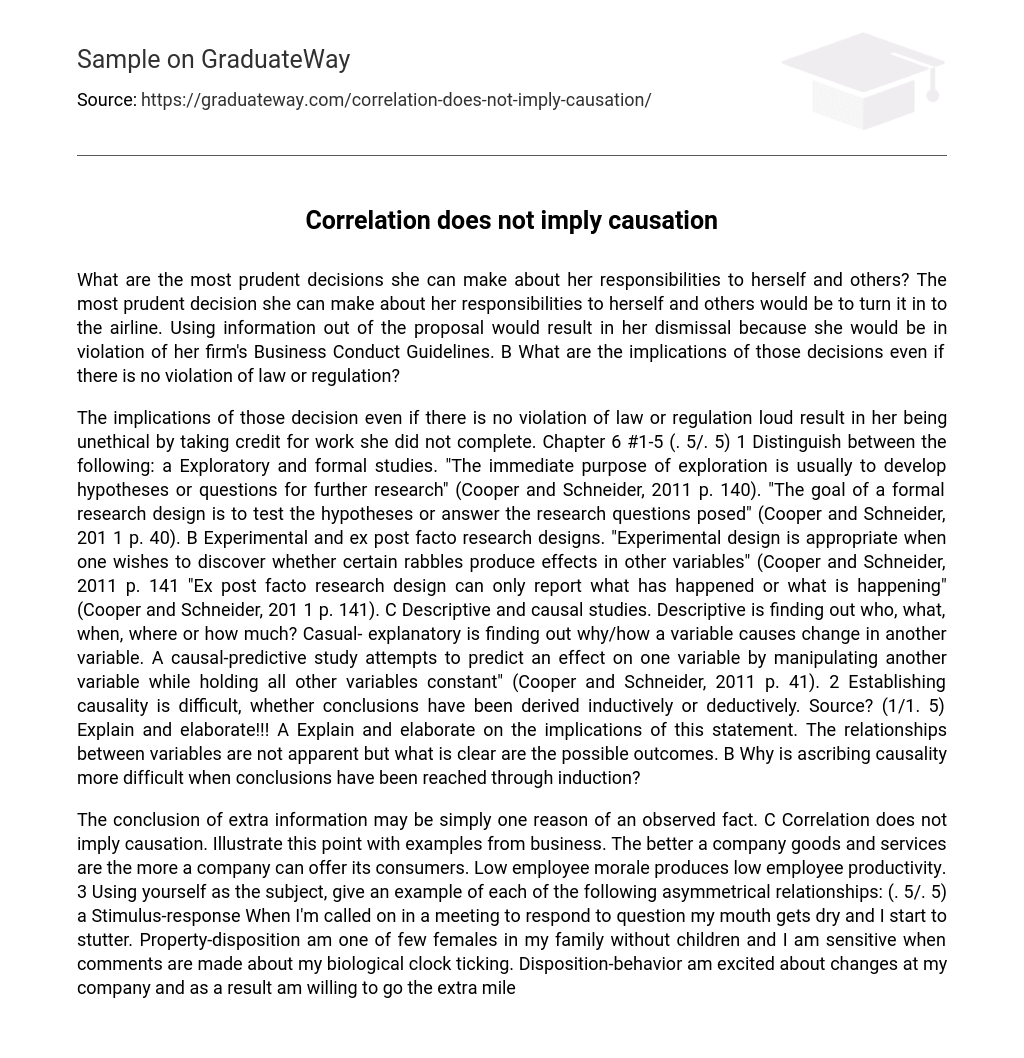What are the best choices she can make regarding her responsibilities to herself and others? The optimal choice is for her to submit the proposal to the airline. Using information from the proposal would violate her company’s Business Conduct Guidelines, potentially resulting in termination. Even if no laws or regulations are violated, what would be the outcomes of these decisions?
The text examines the consequences of certain choices that can result in unethical conduct. It emphasizes the distinction between exploratory and formal studies, whereby the former seeks to generate hypotheses or questions for further investigation, while the latter concentrates on testing hypotheses or answering research inquiries. Furthermore, it distinguishes between experimental and ex post facto research designs, with the former suitable for uncovering causal effects and the latter solely reporting on past or current events. Additionally, it clarifies the disparity between descriptive and causal studies, where descriptive studies concentrate on gathering information about who, what, when, where, or how much; whereas causal studies aim to comprehend why or how one variable influences changes in another. Lastly, it mentions that establishing causality is challenging regardless of whether conclusions are derived through induction or deduction.The connections among variables may not be apparent but potential outcomes are clearly defined. Why is assigning causality more difficult when conclusions are based on induction?
The point that additional information could explain a observed phenomenon is valid. It’s important to understand that correlation does not always mean causation, which can be seen in business. For example, the products and services offered by a company can impact how much it provides to consumers. Likewise, low employee morale directly affects employee productivity. To further illustrate this concept, let’s look at some examples of asymmetrical relationships: (.5/.5). First, in a stimulus-response scenario, when we’re asked a question in a meeting, our mouths become dry and we start stuttering. Second, when it comes to property-disposition relationships, some females in my family have children while I don’t; therefore I’m sensitive when comments are made about my biological clock ticking. Thirdly, in a disposition-behavior case, if we’re enthusiastic about changes at our company, we’ll go above and beyond to meet an upcoming deadline. Finally, regarding property-behavior relationships, our parents taught us to treat everyone fairly and now fairness influences all aspects of our behavior. This raises the question of why relying solely on randomization shouldn’t be enough to control extraneous variables instead of using more control variables.
Randomization is a technique that helps to balance the influence of extraneous variables and control variables that could confuse a causal relationship.
Source? (. 5/. 5) 5
Researchers use either experimental or ex post facto research designs to investigate causal relationships.
(. 5/1) a
What similarities exist between these two approaches?
These two approaches share similarities in terms of dependent and independent variables. Additionally, they both aim to establish time order relationships. They also strive to eliminate the confounding effects of other variables on the IV-DVD relationship.
b
How do these two approaches differ?
Experimental design allows for the manipulation of variables, while ex post facto research does not.
Basically, ex post facto research is straightforward and does not involve any manipulation. The wrong question is asked in Chapter 4 #7. Instead, it should be Chap 1447. The question is how the existing database of service complaints can be used to gather service problem information before the proposed research. The information that should be sought depends on the amount of information available in the database. Specifically, the past issues of the service center and their responses to those issues should be sought.





